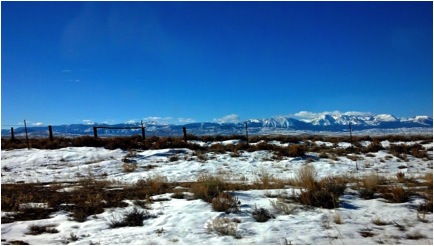
The day after Thanksgiving, my parents and I drive from Laramie to Winter Park in a rental Buick. We go to see what we hear is worth seeing in Colorado, and we confuse it for all that there is.
We stop in Walden, just south of the Wyoming border and the Medicine Bow mountains. I wonder if the name has anything to do with Thoreau, or if names in the West aren’t after names in the East like names in the East are after places and people in England. I need a bathroom break and my father says it’d be nice to stretch his legs.
We find an empty cafe with a mounted moose’s head in the entryway. Her nose protrudes over the straw mat and casts a shadow over the rack of maps and brochures for hot springs and ski resorts (none advertised anything to do with Walden). I examine the moose’s fur and plastic eyes and think of who killed her.
On the way out of town, we turn right off the main street around a small square cemetery with granite headstones. Dry snow is on the ground.
I look at the cemetery. A man is there, kneeling in the snow, his face to the ground and his bare hands clutching his neck like they’re all that link his head to his body. He rocks back and forth. He’s the only person in sight.
I don’t know whose grave he kneels upon, or how long she’s been buried. I assume it’s a woman under there, one who made him feel loved and whole. He rocks like he doesn’t know how the ground beneath him is still solid or if it is. He holds his head like he doesn’t know if the sun is the same sun, if it burns just as strongly as it did when she was here, even on him, and if his skin will still tan and dry and crack. I imagine his hands look like my father’s.
I picture him at home. He has the wood stove from my grandmother’s house in Vermont and my childhood black lab with white hairs under her chin—but his lab is a boy, wider in the shoulders and jaw.His kids are grown and moved to Denver or Fort Collins; they give him a call on Thanksgiving but go to their in-laws’ for the meal. In the supermarket the town over, he puts a turkey in his basket and then returns it to the open freezer. He drinks whiskey and eats oatmeal for dinner.
When he wants his mind to be anywhere but where it goes and stays—forever back to her and not-her—he walks outside in wool socks and feels the snow melt to the heat of his feet. The snow is blue, the sky is black, and the air is a dry, deep cold that smells like pine. He becomes numb and his head is silent. And then she comes back to him, and his feet ache and burn when they hit the wooden floor inside.
I watch him rock like that for a few seconds, on the cemetery’s high ground next to the farms next to the mountains, and think of his wet and raw knees on the frozen dirt. Then we bear left, behind a Honda with a California license plate, toward what we’ve been told is worth seeing.
Anna Hogeland is a clinical social worker and writer living in Boulder, Colorado.




